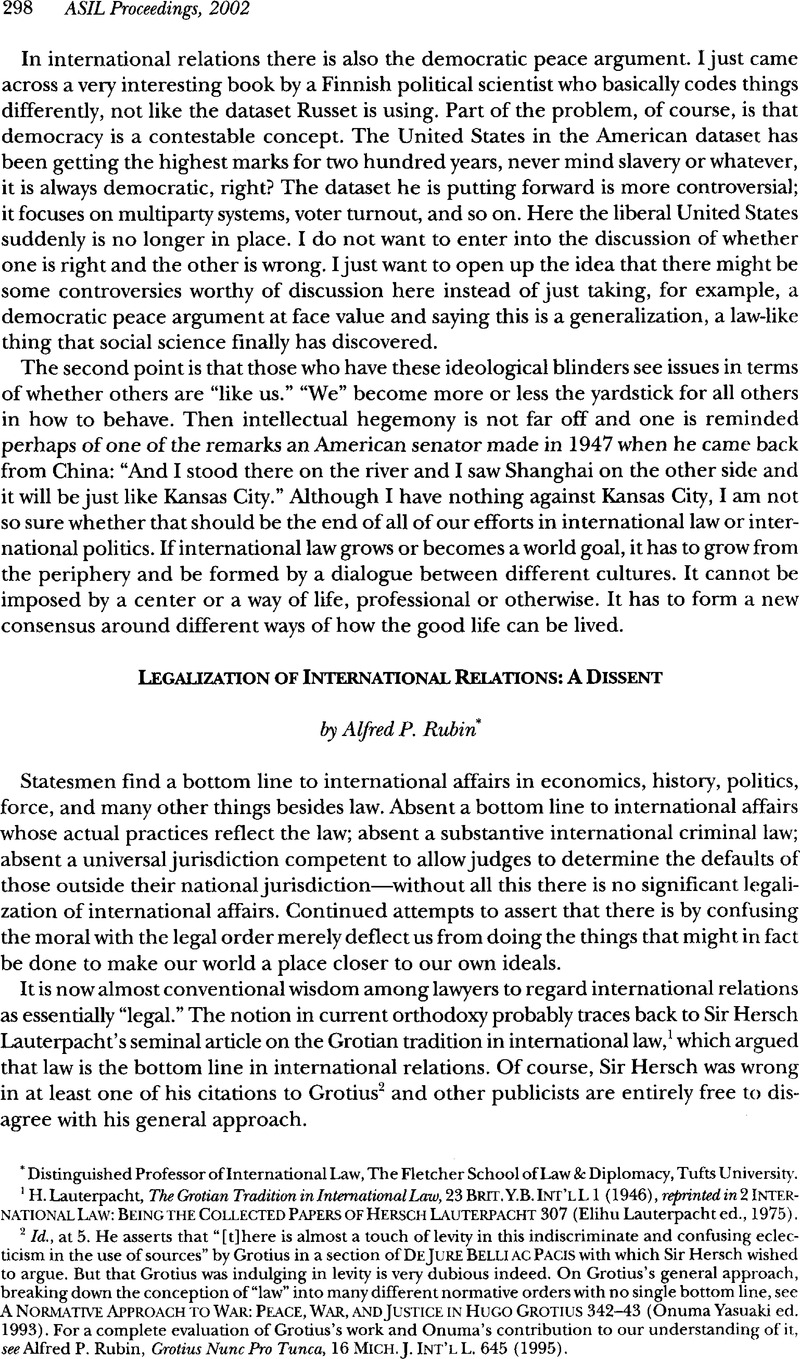No CrossRef data available.
Article contents
Legalization of International Relations: A Dissent
Published online by Cambridge University Press: 28 February 2017
Abstract

- Type
- The Legalization of International Relations
- Information
- Copyright
- Copyright © American Society of International Law 2002
References
1 Lauterpacht, H., The Grotian Tradition in International Law, 23 Brit. Y.B. Int’l. 1 (1946)Google Scholar, reprinted in 2 International Law: Being the Collected Papers of Hersch Lauterpacht 307 (Elihu Lauterpacht ed., 1975).
2 Id., at 5. He asserts that “[t]here is almost a touch of levity in this indiscriminate and confusing eclecticism in the use of sources” by Grotius in a section of De Jure Belli Ac Pacis with which Sir Hersch wished to argue. But that Grotius was indulging in levity is very dubious indeed. On Grotius’s general approach, breaking down the conception of “law” into many different normative orders with no single bottom line, see a Normative Approach to War: Peace, War, and Justice in Hugo Grotius 342-43 (Onuma Yasuaki ed. 1993). For a complete evaluation of Grotius’s work and Onuma’s contribution to our understanding of it, see Rubin, Alfred P., Grotius Nunc Pro Tunca, 16 Mich.J. Int’l L. 645 (1995)Google Scholar.
3 Aristotle, the Nichomachean Ethics V.ii (esp. 1130b and 1131a in the Bekker numerology).
4 William of Occam was a British monk dying about 1349, normally considered responsible for the fundamental rule of parsimony: The basic philosophical and scientific notion that the simplest explanation with the fewest exceptions should be accepted as a working hypothesis for further reasoning: “Essentia non sunt multiplicando praeter necessitatem.”
5 See Benjamin B. Ferencz, Defining International Aggression (1975) (tracing attempts to define aggression to well before the Nuremberg trial).
6 Thomas Jefferson, Notes on the State of Virginia (1781-1785) as reported in John Bartlett, Familiar Quotations 3436 (Justin Kaplan ed. 1992).
1 Belgium v. The Netherlands, 1959 ICJ Rep. 1 (1959).
8 See Edwin W. Patterson, Jurisprudence 102 (1953). See, generally, Jeremy Betham, An Introduction to Principles of Morals and Legislation (1789); Marchese De Beccaria, Essayon Crimes and Punishments (Beccaria lived from 1738-94 and this essay is termed by Morris R. Cohen and Felix S. Cohen as “probably the most influential essay ever written on the subject.” (Cohen & Cohen, Readings in Jurisprudence and Legal Philosophy 346 (1951)).)
9 U.S. v. Coolidge, 14 U.S. (1 Wheaton) 415 (1816). See also V.S. v. Hudson, 11 U.S. (7Cranch) 32 (1813). see also Alfred P. Rubin, Ethics and Authority in International Law 87 (1997). Judges seem reluctant to forego their common law authority to determine the content of international criminal law; the decision not to bring such cases is made by the Attorney General of the United States and no such cases have in fact been brought in the United States for almost 200 years now.
10 Alfred P. Rubin, the Law of Piracy 331-72 (1998).
11 Barcelona Traction, Light, and Power Co., Limited (Belgium v. Spain), 1970ICJ Rep. 1.
12 Id., at paras. 33-34.
13 ICJ Statute, Article 59 (June 26,1945) : “The decision of the court has no binding force except between the parties and in respect of that particular case.” Of course, it might be argued that the logic of a decision is not the decision itself, but this and similar arguments are unlikely to persuade many.
14 Indeed, increasingly not even to lawyers. See the Arrest Warrants Case (Belgium v. Congo) decided by the ICJ too recently (2002) to be properly footnoted here. See ICJ-CIJ Web site at <http://www.icj-cij.org>.
15 See Rubin, Alfred P., Is International Criminal Law ‘Universal’? 2001 U. Chi. Legalf. 351-55 (2001)Google Scholar.


